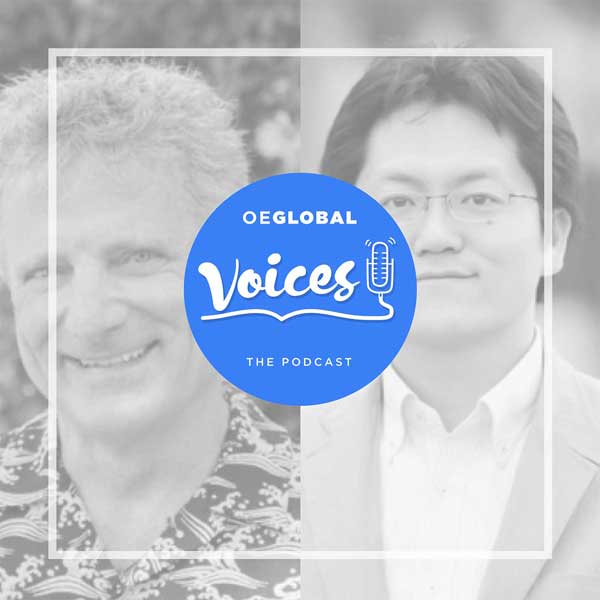In our second episode of OEG Voices we travel virtually to Sapporo, Japan to introduce you to Katsusuke Shigeta, Associate Professor in the Information Initiative Center at Hokkaido University, as well as Associate Director of the Hokkaido University’s Center for Open Education (as you learn more about Katsu you will find there are even more titles).
Listen now to OEG’s Paul Stacey and Alan Levine conversation with Katsu.
Hokkaido University is one of northern Japan’s largest public universities, and thus it is not surprising that it supports the Center for Open Education where Katsu works. The center promotes Open Education Resource (OERs) usage by faculty and also leads development of over 500 new OERs. They promote teaching online using OERs primarily as learning materials.
Katsu noted that the motivation for OER adoption in Japan is not related to the affordability of textbooks (like in the US and Canada) but more by being a more effective means to create online learning materials.
Katsu shared that his interest in open education started at a 2008 presentation in Tokyo by Toru Iiyoshi (then of MIT) co-editor of “Opening Up Education”. Inspired by the talk, Katsu asked Iiyoshi where in the US he should go to learn more about open education.
This came to happen when awarded a Fulbright fellowship, Katsu was able to spend six months visiting colleagues at UC Berkeley and also travel around the US to attend relevant conferences.
Amongst Katsu’s current interests, we heard him describe a joint research project with Adobe to develop OERs for teaching digital literacy based on the UNESCO Global Digital Literacy framework.
His other focus now is on the dissemination of open content for students affected by COVID-19. First year students have even more challenges this year as they are studying at home. Katsu hints that the efforts going on now to use online learning to teach during the pandemic will change things going forward:
“Our notion of education methodology may likely change, we may create a new normal”
Katsu described efforts to gain faculty interest in using open materials. One effective approach as been to identify unique fields, like nuclear education that need development of new content. After the 2011 earthquake that triggered the Fukushima Daiichi accident, Japan has faced an urgent need to find students in this field. Katsu describes that a focus on creating OERs has been effective in supporting the development of new field.
In describing the landscape of open education in Japan, there are several key organizations that have different foci. The Japan Open Courseware Consortium leads development of materials in the spirit of the MIT’s Open Courseware. JMOOC serves as a clearinghouse of Massive Online Open Courses offered in Japan. And the Asuka Academy works on translating OERs into Japanese. There is a common element to all three of these organizations- Katsu Shigeta is involved in all of them!
He note that the challenges of addressing COVID-19 is an influence for different organizations to work more together.
Katsu also describes the need for balance of awareness of issues and trends at a global level but also to attend to local needs:
We should know what is happening a global scale and also know what we should do at local level.
One thing Katsu is enjoying now are his classes in digital society where students are creating OERs that future students will be using to learn from.
It was wonderful to hear Katsu’s perspective on open education in Japan. We are fortunate to have Katsu as a member of the Open Education Global Board of Directors as well as his co-leadership on the planning committee of the 2020 Open Education Global Conference.
As you can hear, he is an enthusiastic proponent of open education. Learn more about Katsu from his web site https://jamsquare.org/.
Music used in this episode was Sunset Part 2 by Podington Bear shared under a Creative Commons CC BY-NC license from the Free Music Archive.
